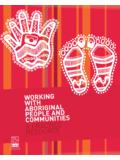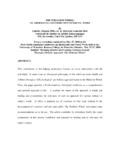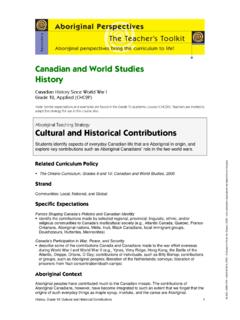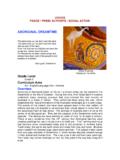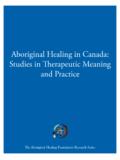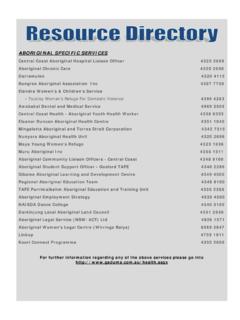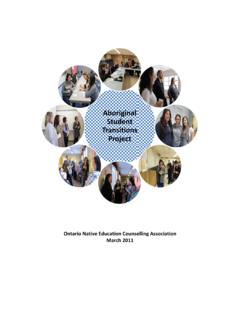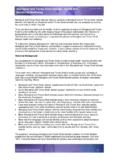Transcription of Lisa Murdock, M.A. May 2009
1 young aboriginal MOTHERS IN WINNIPEG Lisa Murdock, May 2009 Project #181 young aboriginal MOTHERS IN WINNIPEG Lisa Murdock, May 2009 Prairie Women s Health Centre of Excellence (PWHCE) is one of the Centres of Excellence for Women s Health, funded by the Women s Health Contribution Program of Health Canada. PWHCE supports new knowledge and research on women s health issues; and provides policy advice, analysis and information to governments, health organizations and non-governmental organizations. The views expressed herein do not necessarily represent the official policy of the PWHCE or Health Canada.
2 The Prairie Women s Health Centre of Excellence 56 The Promenade Winnipeg, Manitoba R3B 3H9 Telephone (204) 982-6630 Fax (204) 982-6637 This is project #181 of the Prairie Women s Health Centre of Excellence. ISBN 978-1-897250-23-5 young aboriginal MOTHERS IN WINNIPEG Lisa Murdock, May 2009 young aboriginal Mothers in Winnipeg Prairie Women s Health Centre of Excellence i Acknowledgements Prairie Women s Health Centre of Excellence would like to extend a special thank you to all of the individuals and organizations that assisted with this research project.
3 Namely, we would like to express our gratitude to all of the key informants who helped with the recruitment of participants for this study, including representatives from the Indian and M tis Friendship Centre, Andrews Street Family Centre, Native Women s Transition Centre and North Point Douglas Women s Centre. We would like to extend a note of appreciation to the key contact individuals who kindly offered space within their organization for our researcher to conduct her research. In particular, we are especially grateful to Heather Block from the Andrews Street Family Centre, Gloria Nabess from the Native Women s Transition Centre, Muriel Lamy from the Community Education Development Association, and especially, to Jennifer Pretula and Kimberly Brouillette from Mount Carmel Clinic for diligently taking and responding to our researcher s many phone calls and emails for room bookings.
4 We would like to forward our gratitude to Jo-Jo Sutherland from the Native Women s Transition Centre for providing a cultural component to our focus group discussions and her words of wisdom and support when needed most. Finally, we would like to express our sincere appreciation to all of the women who took time out of their busy schedules to sit down with our researcher to share their knowledge, perceptions and experiences around teen pregnancy and parenting as a teen. Without your stories, this research may not have been possible; thank you.
5 CONTENTS Acknowledgements Executive young aboriginal Mothers in Methods and Procedures ..6 Study Participants ..7 Knowledge and Perceptions on Sex, Protection and The Meaning of Regarding Thoughts on Sex Education ..14 Teen Pregnancy among aboriginal Personal Experiences with First Sexual Disclosing Sexual Activity ..27 Subsequent Sexual Unsafe Sex Personal Experiences with Teen Becoming Disclosing Teen Pregnancy ..41 Being Giving Parenting as a Parental Expectations ..52 Parental Wants and Wishes.
6 66 Identifying the Needs of young aboriginal Program Awareness and Utilization ..69 Suggestions for Improvement ..75 Summary of Appendix A: Focus Group Discussion Appendix B: Self-Administered Questionnaire ..95 Appendix C: Individual Interview Guide ..96 young aboriginal Mothers in Winnipeg Prairie Women s Health Centre of Excellence i i Executive Summary In the fall of 2008, Prairie Women s Health Centre of Excellence (PWHCE) conducted a study, young aboriginal Mothers in Winnipeg. The aim of the study was to develop a better understanding of the issues surrounding teen pregnancy among aboriginal women, in order to adequately respond to the needs of young aboriginal mothers through effective policies, programs and practices.
7 While the key findings from the research may not be representative of all aboriginal women, they do reveal that, overall, this group of women did appear to have an adequate understanding about sex, protection, pregnancy and safe-sex practice; however, their knowledge in this regard was relatively new and fairly simple. The women routinely engaged in unsafe sex practices, most notably because the use of protection between committed partners was viewed as unnatural and not normal. Consistent with their own perceptions on the issue, the women trace their own experiences with teen pregnancy back to the familial situations in which they were raised, and their consequential search for love and attachment.
8 While the majority of pregnancies among this group of women were unplanned, several women maintained that their pregnancy was planned, sometimes in consultation with their intimate partner at the time. In any case, the general feeling among the women with regard to their pregnancy and their decision to become a teen mom was that of happiness. While parenting as a teen did prove to be challenging, for the most part, the women appeared satisfied with the decisions they made around their adolescent pregnancy.
9 The challenges identified by the women included those which centered on the women s financial hardship, lack of parenting and lifeskills, limited access to adequate housing and childcare, and difficulties around transportation. The women expressed a strong desire to further their education, find employment, and possibly have more free time for self-care. As such, the women recognized their need for better program awareness and more programs designed to assist not only young moms, but young dads as well.
10 They suggested that such programming should include a cultural component and provide services with include respite, mentorship, addictions counseling, parenting and lifeskills, and communication development. The women identified the need for motivational and reality speakers, as a means of preventative education, and they stressed the need for more assistance around education and childcare. As presented in the women s own words through excerpts from their discussions with the researcher, this report offers valuable insight with which to better meet the needs of young aboriginal women who become pregnant, or are at risk of becoming pregnant, during adolescence.



